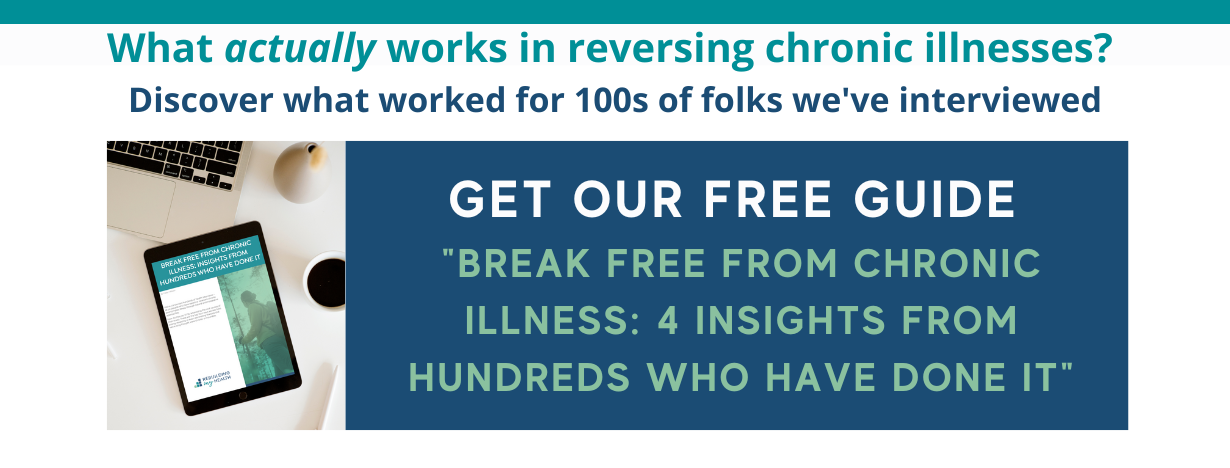Autistic Son Speaks First Words after Switching to Anti-Inflammatory Diet
Shortly before the age of four, Jason* spoke his first words. And not just a word here and there, but three-word sentences.
For his parents, it was an emotional breakthrough – and confirmation that they were on to something.
Two weeks before, they had changed his diet. Almost immediately, they noticed changes to longstanding challenges.
Jason’s skin tone improved. The circles under his eyes disappeared. His digestion returned to normal after years of difficulty.
And then, he spoke.
“He had previously been nonverbal, and within two weeks, he started putting together three-word sentences, which was insane,” says his mom, Crystal. “It was like all this information was locked inside and whatever this diet was doing for him allowed him to be able to use it.”
Troubling Difficulty and Delays from the Start
From his earliest days, Jason had never been a textbook child. He slept erratically long after the early newborn days, usually only in three-hour increments.
“We did all the things you’re supposed to do,” Crystal says.
But the poor sleeping continued for years.
They also noticed that his skin looked pale or gray.
“His skin lacked the vibrance you would expect to see from a child,” Crystal says. “And he had dark circles under his eyes.”
And one Halloween, after eating three pieces of candy, he broke out in a full-body rash.
His digestion had also always been poor, with meals often causing him to get sick soon after – despite having a relatively balanced diet.
But most concerning were the delayed gross motor skills. Jason rolled over and crawled late, and walked at almost the age of two.
“His gross motor skills were totally off and we just chalked it up to him being kind of laid back,” Crystal says. “You know, as a first-time parent, you don’t want to admit there’s anything even remotely wrong. We just thought he was laid back and really big, so it was harder to move around.”
And, he wasn’t speaking on schedule.
Yet, Jason showed signs of advanced intelligence very early.
“He was really kind of amazing at identifying numbers and patterns and even reading before he could talk,” Crystal recalls. “At two, he could look at the word ‘dog’ and he would be able to point to a dog. Some things were really outstanding and then other things just were not happening.”
The Specific Carbohydrate Diet and Autism
Shortly before Jason’s fourth birthday, Crystal noticed that Jason’s fingernails were peeling from the top down.
Alarmed, she began looking online for answers to his peeling nails, as well as what she suspected to be the cause of Jason’s health issues and development delays: autism.
While his parents suspected autism early on, they wouldn’t get an actual diagnosis until he was five or six.
But Crystal proceeded under the assumption that autism was the source. Eventually, she came across information about the Specific Carbohydrate Diet and autism.
In the 1950s, a mother named Elaine Gottschall was seeking a remedy for her young daughter’s ulcerative colitis, an autoimmune digestive disorder. She teamed with Dr. Sidney V. Haas, who had researched and recommended a diet to help those with inflammatory bowel disorders. The diet worked so well for her daughter that Elaine went on to write a book about the turnaround and the diet responsible, “Breaking the Vicious Cycle.”
The diet, however, has also shown promise for those with autism.
“Autism actually has a close connection to autoimmune issues,” Crystal says.
As soon as she found the diet, Crystal cleared out her pantry and started her son on it. The Specific Carbohydrate Diet (SCD) is so-called because it only allows specific carbohydrates, those which won’t trigger inflammation. SCD eliminates grains, sugars and other foods that contribute to inflammation and irritation.
Although dairy is allowed on SCD, the Jordan family removed it from Jason’s diet. Dairy, for many, has been found to be irritating for digestive issues and a contributor to inflammation.
Within just two weeks, positive changes began popping up. Jason’s digestive issues cleared and his skin color returned to normal.
Then he spoke his first words. “It was like a choir singing,” Crystal recalls.
And over time, his fingernails stopped peeling.
Progress that Inspires Diet Compliance
A restricted diet can be especially challenging with children, particularly picky ones such as Jason. Crystal eased in by focusing on foods that she knew he would actually eat.
She also cleared out non-compliant foods to reduce temptations. She found recipes in advance so that they were not caught without a plan.
And, she says, seeing almost immediate confirmation helped them keep going.
Along with the diet, Crystal added fish oil, B-12 and probiotics from Body Ecology.
A Boy at His Personal Best
Now 11, Jason has remained on the diet and is thriving. Besides improving his motor skills, skin and digestion, the diet also seems to bolster his immunity. He hardly ever gets sick.
His mom describes him as a delightful, gentle giant who can’t stand seeing anyone get hurt or having their feelings hurt. He’s into Power Rangers, Avengers and Star Wars, and is a gifted musician. In fact, he can hear a song and then play it fairly accurately on the piano.
His hyperlexia allows him to learn and retain an impressive volume of facts. At the age of seven, he knew 200-plus countries and their capitals and currencies, and all the presidents in their chronological order.
And currently, he wants to be a sound editor when he grows up.
With regular dedication to the diet, Crystal finds that her son can occasionally have non-compliant foods without a setback, such as pizza or cake at a birthday party.
SCD has changed their life in other ways too. A few years ago, Jason’s father was diagnosed with an autoimmune disorder and also became zealous about the diet.
“He’s the craziest of us all about his diet because he knows what optimal feels like,” Crystal says. “He feels reduced inflammation and fatigue.”
After their powerful personal experience, Crystal also went back to school to earn a degree in nutrition and now helps other families discover the life-changing connection between diet and autism, along with other health challenges.
“Collectively, it’s just amazing,” Crystal says. “Our son still has autism, but the diet allows him to be his personal best.”
*Name changed because a minor is featured.
If you liked this story, you might also find this one insightful: Crossing Out an Autism Diagnosis: One Family’s Inspiring Story.
The information on this site is for educational and inspirational purposes only and is not intended to replace the advice of qualified professionals. Keep in mind that what works for one person may not work for another. Always consult your healthcare practitioners before beginning new approaches or treatments. Some links on Rebuilding My Health may be affiliate links. This means that we may receive a commission - with no additional cost to you - if you make any purchases using those affiliate links. Rebuilding My Health is a participant in the Amazon Services LLC Associates Program. Learn more.



